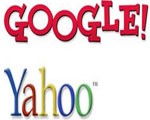 San Francisco — Odd couples Google Inc. and Yahoo Inc., the two largest search engine titans on the Internet have reportedly decided to opt-out of implementing a controversial search advertising partnership that would essentially devour part of Yahoo’s advertising business and create an online ad behemoth that critics say no rival could possibly compete against, Yahoo said on Friday.
San Francisco — Odd couples Google Inc. and Yahoo Inc., the two largest search engine titans on the Internet have reportedly decided to opt-out of implementing a controversial search advertising partnership that would essentially devour part of Yahoo’s advertising business and create an online ad behemoth that critics say no rival could possibly compete against, Yahoo said on Friday.
The two companies have agreed to a “short” postponement in implementing this agreement while our ongoing talks with the US Justice Department continue, Yahoo and Google said yesterday in e-mailed statements. “We have had discussions with regulators and look forward to responding to their questions about this agreement.”
Google issued a similar statement:
“At the time of announcing our advertising partnership with Yahoo in June we had already decided to delay its enforcement until October to allow more time for regulators to look at the details. As we are still in discussion with the Department of Justice we have agreed to a brief delay in implementing the agreement while those discussions continue,” the company said.
Google Chief Executive Officer Eric Schmidt said in August the partnership would begin in early October.
The delay was expected to last less than a month, a source familiar with the discussions on the issue told Reuters. Antitrust regulators need more time to consider the proposal. This is a turnaround for Google — CEO Eric Schmidt last month indicated the companies intended to move forward regardless of investigators’ progress. “We are still looking at the time frame of October,” the source said.
The advertising deal between the two search heavyweights became very controversial, when consumers advocates, advertisers and regulators issued concerns that it might contribute to an anti-competitive environment.
Competitors, consumer advocates and customers equally questioned whether the deal would give Google too much control over advertising and information on the Web. Increased scrutiny by regulators could limit Google’s growth, said Ben Schachter, an analyst at UBS AG in New York.
“The biggest threat to Google is not competition, but clearly increasing government regulation and legal issues,” Schachter, who recommends buying Google and Yahoo shares, said in an interview this week. “Regulatory issues are going to be a primary concern.”
The planned online advertising pact could be used to demonstrate that politicians and regulators blamed for letting financial markets self-destruct are now better watching out for people’s economic interests.
“You hook up Google and Yahoo and you have effectively created a lockout monopoly and regulators are not going to have a good sense of humor,” analyst Rob Enderle of Enderle group told AFP.
“At present, if you are a company making lots of money you do not want to piss off any of the regulators. They want to showcase that there is a new sheriff in town. Even oil companies are not safe.”
Both California Internet titans have defended the ad pact on Capitol Hill and in online statements.
The deal, which was announced back in June soon after the talks between Microsoft and Yahoo failed to reach a conclusion, empowers Google to sell advertising for some of Yahoo’s online advertising space, is unpopular with advertisers who fear higher prices. Yahoo expects to get between $250 and $450 million in incremental operation cash flow out of the agreement.
Google’s web-search market share increased to 63 percent in August, whereas Yahoo sank to 19.6 percent and Microsoft Corp slipped to 8.3 percent, according to comScore Inc.
But both Google and Yahoo rejected claims that their partnership would disrupt competition, increase prices for advertisers, and give them complete control over the search advertising market. The companies argued that this is not a merger; on the contrary, it will help Yahoo consolidate its business and its position as a stronger competitor.
Bob Liodice, president and CEO of the Association of National Advertisers, said his organization was opposed to the pact. “We are appreciative that Google and Yahoo are delaying,” he said.
On Thursday, Sen. Herb Kohl, D-Wis., the chairman of the U.S. Senate Antitrust Subcommittee, asked the U.S. Department of Justice to keep a close eye on Web advertising and the degree of competition within the industry, should it allow the Google/Yahoo partnership to go through.
Numerous other opponents of the alliance have even expressed their belief that Yahoo will have less incentive to compete against Google, as it will rely upon its main competitor for a significant increase in its revenue.
Microsoft senior vice president and general counsel Brad Smith has explicitly debated that the agreement between the two would crimp competition and give Google “unprecedented” control of the gateway to the Internet.
“If search is the gateway to the Internet, and most believe that it is, this deal will put Google in a position to own that doorway and the information that flows through it,” Smith told a Senate Judiciary subcommittee in July.
Last week, the American Antitrust Institute has followed a more optimistic position concerning the deal, by releasing a white paper on both the dangers and the benefits that would arise from this partnership.
The AAI was not the only one seeing a positive side to the Yahoo — Google deal. Last week, a group of 11 U.S. lawmakers from California urged the government not to block the deal, saying Google would not gain power because the agreement was not a merger.
The lawmakers argued that the partnership is not a merge, therefore it should not be considered as one, especially since there are or have been other similar agreements in the industry. The discussions with the Department of Justice continue.
An antitrust lawyer, who regularly brings mergers to the Justice Department, said that the delay was probably not a good sign for Google and Yahoo.
“It means that they were not going to get a clean bill of health in time, and perhaps it is much worse than that. They do not want to go forward and be told that there is potentially a very serious problem there,” said the lawyer.
In a sign of the seriousness of its investigation, the department last month hired a top litigator Sanford M. Litvack, to help assess the evidence gathered by its lawyers.
Litvack was the department’s antitrust chief under former U.S. President Jimmy Carter and Walt Disney Co.’s former vice chairman.
Yahoo Chief Executive Officer Jerry Yang, 39, opted for the Google accord after rejecting Microsoft’s takeover advances earlier this year. In August, investors withheld about one-third of their votes for Yang’s re-election to the board in a demonstration of their displeasure.
Microsoft, based in Redmond, Washington, has opposed the deal, stating it will bestow Google with 90% of the search-based ad business. Microsoft spokesman Jack Evans declined to comment yesterday.
No date is set for the probe to conclude, said a person with knowledge of the decision, who asked not to be named because the talks are private.
Gina Talamona at the Justice Department declined to comment except to say the investigation continues.


